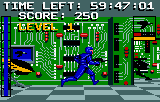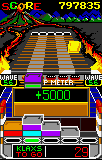 |
 |
Greg Omi: ElectroCOP! |
|
Greg Omi's Body of Work! |
|
Tell us a little bit about yourself. What you're into and how you came to work on the Lynx.
I've been in the game industry since around 1980, but I've been making games my whole life. I'm the youngest of six kids, so there were always games around our house and if we didn't have a game we'd make one up. Growing up in San Francisco during the 60's was great. One of my neighbors was Gilman Louie of Spectrum Holobyte.
I started programming after I quit college. On a whim I went off to Phoenix to study electronics. School turned out to be way too easy, so I dropped out and moved back to San Francisco. When I got back Gilman had started a game company (Voyager Software) and asked me if I wanted to program this new machine called the Atari 400. Having no programming experience I picked up a book and taught myself to program. I quickly realized that BASIC was too slow and if I wanted to make arcade style game I needed to learn assembler.
Gilman and I had a rocky working relationship and I remember quitting several times. During one of these breaks I got a job at HES and worked on Defender for the Vic-20. Jeff Minter was supposed to do it but decided to go on vacation instead. HES had a contract with AtariSoft and needed the game done in 12 days. Alick Dziabczenko had a game called Protector, so he and I changed it into Defender.
At some point when I was working at NEXA the Nelson brothers (Craig and Scott) and I think Bob Lindsay game by to see a game the company was working on. I had nothing to do with that game, but since I was the chief technical guy, and they wanted to impress Epyx, we pretended I was on the project. Epyx always had a programming test that they gave to see if you knew what you were talking about I was the only guy that really knew assembly at the time and answered most of the questions. I later found out that Craig was really impressed and told Bob that he should try to hire me. It turns out that Bob Lindsay was at AtariSoft when Alick and I did Defender, when I mentioned to him that we had written it in 12 days, he told me that he had heard, but nobody at Atari believed it was true.
I worked with Epyx on and off for many years. I would work for a while, get burned out, quit the game industry forever (this time for sure), and then when I was broke I would get a call with an offer I couldn't refuse. The Lynx or Handy as we called it was one of those offers. Chuck Sommerville called me up and said "Hey Greg, how would you like to work on a top secret hardware project?" I always wanted to work on hardware, so how could I refuse.
What was it was like working for Epyx?
Epyx was a great place to work. The renaissance comes to mind when I think of those days. I imagine the Manhattan project had a similar feel. It was the first place I ever worked were all of the programmers were great. No one was great at everything, but everyone had something they were great at. I learned so much there, and really enjoyed the experience. Up to that point I was always one of the lead guys, it was really nice to be around people who I felt were better than I was.
What is your perspective of the sale of the Lynx to Atari?
None of us wanted the Lynx to be sold to Atari. They had a reputation of not paying and we were pretty sure that would happen. Epyx dug its own grave though; many things conspired to end the company. Epyx survived as long as it did because it had 1 hit game a year. At the time of the Lynx development it didn't have that hit which kept the company going. They also made some big mistakes in the marketing department. They kept buying these mediocre games in Europe to help fill sku's and then had large numbers of returns. There were also the inferior joysticks with the 5-year warranties that kept getting returned.
They also made these videotape based games that were pretty bad. They were done by an outside contractor. Kevin Furry took one of the games for some kids to play before they actually shipped. He found some ways to make it more fun, but it was too late, the games were already in production and couldn't be changed. We were trying to sell it to Sega and Nintendo. Both looked very carefully at the Lynx including the schematics pretending to be interested and then came out with their own systems shortly after. They did the same thing to us at 3DO.
 What was the reaction to
Electrocop when you first showed it off?
What was the reaction to
Electrocop when you first showed it off?
To tell you the truth I can't remember. My brain got lull sometime back in 1998. Old memories are spilling out every time I need to learn something new. I remember that we were emulating everything on our Amiga's at a horrible frame rate. We brought in a professional video recorder to capture 1 frame at a time so that we could see what things were going to look like on final hardware. It would take an hour to get a few seconds of playback. Eventually we got a wirewrap version of the hardware for all of us to share.
Electrocop is an intriguing 3D action game that came long before the whole FPS genre. How hard was it to develop the unusual 3D engine in this game?
At the time I didn't know anything about 3D or matrices or any of the math that I know now. I wanted to have perspective in my game, so I asked Stephen Landrum how to do it. It turned out I needed to have a multiply and divide which weren't in the hardware at the time so I had to write them. As I recall the Lynx couldn't do lull rotation of sprites. We could only make trapezoids. I think Chuck Sommerville was actually trying to do a 3D tank game at the time but he couldn't get the performance that he needed, so he ended up scrapping that and doing Chip's Challenge in the last month or so.
Whose idea was it to include tiny games like Asteroids and Breakout in Electrocop? Are there any more hidden games we don't know about?
Since Chuck's game got cancelled he had some spare time to make the mini games. I think it was my idea but I'm not sure. I thought it would be cool to have a computer in a computer. I didn't have any hidden stuff in my game, but I know that there is a Mandelbrot generator in one of the early games [Chip's Challenge] and a real time life program in another [Zarlor Mercenary]. There is a bug in the released version that I remember. If you turn on all of the computers at the same time the game will crash. I miss counted the number of computers and memory ends up getting trashed.
Electrocop ends rather open-endedly. Was there ever a sequel planned?
No sequel was ever in the works. It's really funny, I can't remember the plot of the game, or how it ends. Did it have something to do with the President's daughter? I would pull it out and play it but I lost my Lynx's and all of my games some time ago. I think I left them at RJ's house or at a party somewhere.
How did you and Lx Rudis become friends?
Lx and I met while working on the Lynx at Epyx. We were living about 6 blocks apart with a bar called The Pub exactly in the middle. We'd always meet there for breakfast or drinks. KLAX was the last Lynx game we worked on together. At the time I really wanted to improve the quality of sound in video games. I sort of thought of it as the final frontier. When KLAX came to me I had an excuse to burn up a lot of ROM space since it had all of those digitized sounds in it.
 The Lynx version of
KLAX is generally regarded as the best home version. What was your secret to making it play so well?
The Lynx version of
KLAX is generally regarded as the best home version. What was your secret to making it play so well?
I wanted the game to look, sound, and play as close to the original as possible. I'm not sure, but think I even copied the random number generator from the coin-op. I definitely copied the difficulty ramping from the little source code that they gave us. The rest of the game was just making sure that the artwork looked right and the audio played right.
How did you get audio samples to play so crisply on the Lynx? Was the stereo panning for the block tumble noises difficult to implement?
The sound is great because of the magic of Lx Rudis. He tuned the sounds to play from that little speaker. He had to record all of the tile sounds off of the hardware and then clean them up because they were pretty crappy. Javier Solis, and I worked together to make stereo happen on the Lynx II. I designed the algorithm and Javier implemented it. I was working on KLAX at the time so I put it in. Howard Delman made a daughter board to plug into the dev system to emulate the final hardware.
The sound samples are dead-on to the arcade. Did you get the originals or re-create them?
Atari Games couldn't give us the raw data from the game because it was compressed somehow, so Lx had to hook up to the speaker on the box. I also remember getting a tape the girl saying "ooh, aah," and stuff. The tape was pretty funny because it contained all of the cuts that weren't used. We were thinking about putting some of that into the intro song, but didn't for some reason. After the Lynx Lx and I went on to make Slime World for the Genesis. I wanted to make it easier for him to create music for the machine so I built this box that turned the Genesis into a MIDI device with a patch editor. We called it the Krelltone because you could get it to make the sounds like in the movie Forbidden Planet. It was called the music of the Krell.
What unpublished games did you work on?
I know this is hard to believe, but I've never had a game cancelled. The closest I've gotten is I had a game turned into a demo on the 3D0 Sampler disk.
What have you been up to since the Lynx days?
Wrote Slime World Genesis, and Andre Agassi Tennis Genesis. Was on the development teams for the 3D0 Multiplayer, 3D0 M2, and 3D0 MX hardware systems, wrote the engines for Crash 2, Crash 3, Crash Team Racing. Worked on the engine for Jak and Dexter.
Greg, thanks for your fine work and for writing this interview!
| Name: | |
| Subject: | |
| Comment: | |
| Check: | What is the greatest video game company of all time? (Hint: Atari.) |